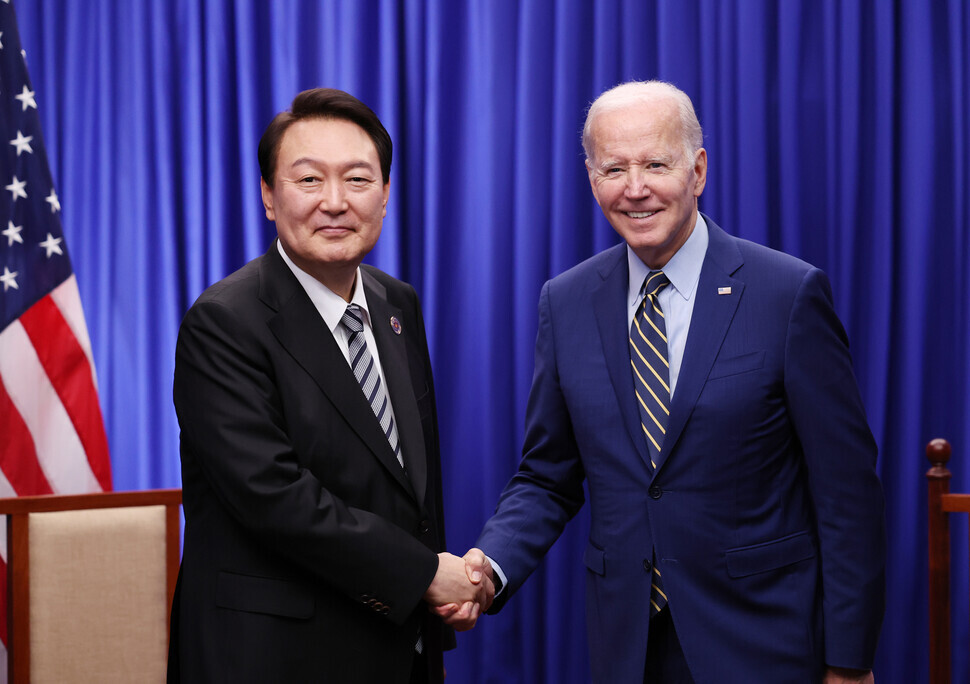hankyoreh
Links to other country sites 다른 나라 사이트 링크
Korea’s Inflation Reduction Act woes touched upon sparingly in Yoon-Biden summit

South Korean President Yoon Suk-yeol and US President Joe Biden agreed to respond even more sternly to North Korea’s nuclear weapon and missile programs in a summit on Sunday, which came two months after their previous summit in September. But in regard to the US’ Inflation Reduction Act, a matter of much interest in South Korea, the discussion didn’t move beyond a generic agreement to continue deliberations.
In their Sunday summit in the Cambodian capital of Phnom Penh, Yoon and Biden agreed on much tougher extended deterrence against North Korea.
“President Yoon and President Biden discussed the North Korean nuclear issue, our joint defense posture, major bilateral economic issues including the Inflation Reduction Act, and regional and global issues,” the South Korean presidential office announced following the summit.
After sharing their concerns about North Korean shows of force, including a recent spate of missile tests, the two leaders agreed to tighten bilateral cooperation and toughen their joint defense posture. Given the recent intensity of North Korean military posturing, including a test launch of an intercontinental ballistic missile, and imminent preparations for what will be Pyongyang’s seventh nuclear weapon test, Biden and Yoon confirmed the principle of making a strong response.
The two leaders agreed to keep discussing ways to effectively and dramatically strengthen the US and South Korea’s extended deterrence.
“We need to show North Korea that it has nothing to gain from its nuclear weapons and missiles. Toward that end, we need to effectively and dramatically strengthen our extended deterrence to correspond to North Korea’s improved nuclear capacity,” Yoon said during the summit.
“Our national security councils and defense officials are in close communication in regard to extended deterrence,” Yoon went on to say, while asking Biden to “keep taking an interest in establishing a stronger and more effective system of extended deterrence.”
Biden responded by reconfirming the US’ commitment to extended deterrence and an ironclad defense of Korea while suggesting that close deliberations about ways to strengthen extended deterrence should continue in the future.
Yoon and Biden also agreed that the two countries would “respond with overwhelming power, using all available means, if North Korea were to use nuclear weapons in any form,” Yoon’s presidential office said.
Also on the agenda was the US’ Inflation Reduction Act, which puts Korean-made electric vehicles at a disadvantage in the US market, but the discussion didn’t lead to any tangible results.
Yoon said that “close channels of deliberation are up and running” between the two countries in regard to the legislation and commented that Biden had “confirmed the US’ determination to hold meaningful deliberations about the Inflation Reduction Act in a personal letter in October.”
Biden didn’t respond specifically, though he did remark that South Korean companies make a major contribution to the US economy in the areas of automobiles and electric batteries and that the implementation of the Inflation Reduction Act should be discussed in light of that fact.
In a related development, Yoon announced during the summit on Sunday that Korea would officially join the US-led Partners in the Blue Pacific (PBP) initiative.
While the ostensible goal of the PBP is to coordinate member states’ cooperation with island nations in the Pacific region and to uncover new areas for cooperation, it is basically a tool for containing and curbing China. By joining the initiative, Yoon makes clear that he means to stay by the US’ side as it seeks to contain China.
Yoon and Biden also predicted that next year, which will be the 70th anniversary of the two countries’ alliance, will mark another milestone in the development of the alliance and agreed to meet again in Washington in 2023. Their summit on Sunday lasted for around 50 minutes, about 20 minutes longer than originally scheduled.
By Bae Ji-hyun, staff reporter
Please direct questions or comments to [english@hani.co.kr]

Editorial・opinion
![[Column] Will Seoul’s ties with Moscow really recover on their own? [Column] Will Seoul’s ties with Moscow really recover on their own?](https://flexible.img.hani.co.kr/flexible/normal/500/300/imgdb/original/2024/0513/5917155871573919.jpg) [Column] Will Seoul’s ties with Moscow really recover on their own?
[Column] Will Seoul’s ties with Moscow really recover on their own?![[Column] Samsung’s ‘lost decade’ and Lee Jae-yong’s mismatched chopsticks [Column] Samsung’s ‘lost decade’ and Lee Jae-yong’s mismatched chopsticks](https://flexible.img.hani.co.kr/flexible/normal/500/300/imgdb/original/2024/0512/3017154788490114.jpg) [Column] Samsung’s ‘lost decade’ and Lee Jae-yong’s mismatched chopsticks
[Column] Samsung’s ‘lost decade’ and Lee Jae-yong’s mismatched chopsticks- [Correspondent’s column] The real reason the US is worried about Chinese ‘overcapacity’
- [Editorial] Yoon’s gesture at communication only highlights his reluctance to change
- [Editorial] Perilous stakes of Trump’s rhetoric around US troop pullout from Korea
- [Guest essay] Preventing Korean Peninsula from becoming front line of new cold war
- [Column] The state is back — but is it in business?
- [Column] Life on our Trisolaris
- [Editorial] Penalties for airing allegations against Korea’s first lady endanger free press
- [Editorial] Yoon must halt procurement of SM-3 interceptor missiles
Most viewed articles
- 1Ado over Line stokes anti-Japanese sentiment in Korea, discontent among Naver employees
- 2[Column] Samsung’s ‘lost decade’ and Lee Jae-yong’s mismatched chopsticks
- 3Korean opposition decries Line affair as price of Yoon’s ‘degrading’ diplomacy toward Japan
- 4US has always pulled troops from Korea unilaterally — is Yoon prepared for it to happen again?
- 5Korean auto industry on edge after US hints at ban on Chinese tech in connected cars
- 6[Editorial] Yoon’s gesture at communication only highlights his reluctance to change
- 7[Correspondent’s column] The real reason the US is worried about Chinese ‘overcapacity’
- 8[Column] Will Seoul’s ties with Moscow really recover on their own?
- 9[Photo] Korean students protest US complicity in Israel’s war outside US Embassy
- 101 in 3 S. Korean security experts support nuclear armament, CSIS finds